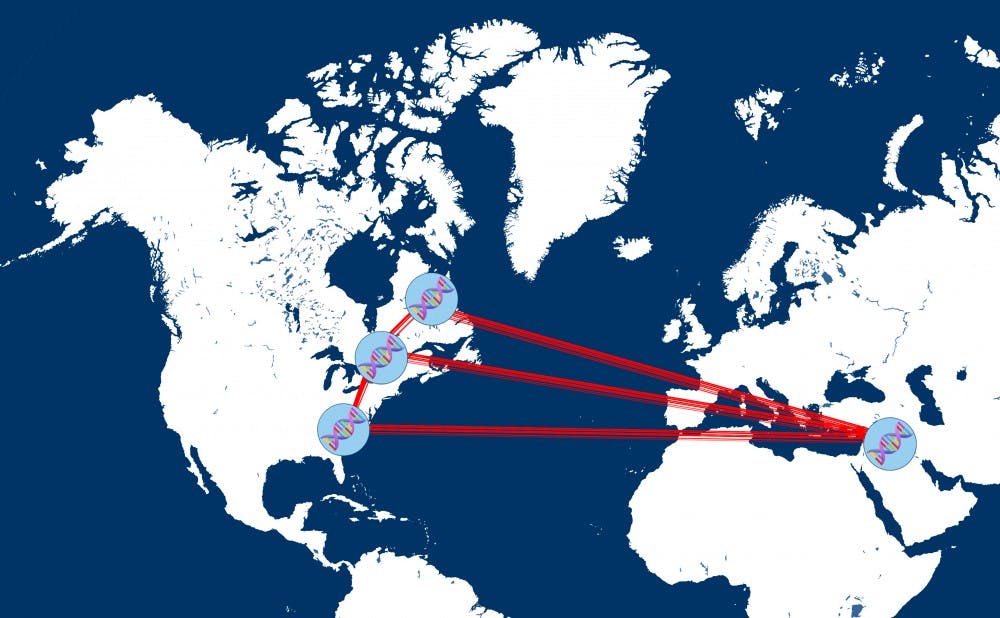Four families, linked through a genetic disorder, found closure due to international research led by Duke.
Researchers at the Duke Center for Human Genome Variation collaborated with labs in Bangladesh, Canada, France and Israel to discover a recessive gene mutation responsible for a rare genetic disorder affecting pre-natal brain development. The identified mutation affects the body’s natural production of asparagine, an amino acid that can be found in dairy, beef and nuts.
Researchers found the mutation by analyzing the DNA from affected children from four families—two of Iranian Jewish descent in Israel, one of Bangladeshi descent in Toronto and one of French-Canadian descent in Quebec—who all had similar cases of brain malformations and seizures.
"The doctors don’t know what’s going on...It’s very difficult for the children as patients,” said Jacques Michaud, associate professor in the department of pediatrics at the University of Montreal and co-author of the paper. “There are MRIs, biopsies—all kinds of tests—and sometimes it takes years to find the genes.”
Michaud’s research team was able to isolate the responsible gene by sequencing the DNA of three individuals in the French-Canadian family and then comparing the results with unaffected individuals in the same family and, later on, the Toronto family.
“I wasn’t sure at first, but then there was a second family with similar clinical features,” Michaud said. “We took a similar approach and again found mutations in the same gene. At that point we said, ‘Well, there’s more than a coincidence.'”
Duke researchers led by David Goldstein, director of the Center for Human Genome Variation, independently discovered the same gene in affected individuals in the Israeli families. Defects in the protein had been previously linked to cases of leukemia, but never before to prenatal brain development.
"We weren't looking for an amino acid metabolism defect," he said. "There was nothing in the patients' presentation that would orient us that way, and that pathway hadn't been connected to this kind of syndrome before."
The newfound link between asparagine and brain development has opened up speculation on potential preemptive treatments, including asparagine supplements for pregnant mothers to limit the developmental effects of the disease.
“There is an option to introduce asparagine supplementation early on that might prevent the disorder or complications, but we’ll have to see the real clinical picture of the condition,” Michaud said. “My guess is that if you don’t give it very early, damage would have already been done."
The Goldstein lab has begun studies on mice with mutations in the identified gene to further explore its effects and the potential of asparagine supplementation as a treatment.
“The really exciting thing about this research is that there is this possibility of just plain using dietary supplementation at the right time,” said Elizabeth Ruzzo, a graduate student in the Goldstein lab and lead author of the paper. “This definitely established a whole new disorder.”
All three of the French-Canadian patients and the three affected children of the Bangladeshi family in Montreal had passed away from their disorder within their first year of life, according to a published report in the scientific journal, "Neuron." Survivors of the disorder suffer from developmental delays and seizures—previously without the possibility of being diagnosed.
“It’s very difficult for parents when you have a child that’s affected, and it’s even worse when you don’t know what your child has,” Michaud said. “You don’t know what’s going to happen, you don’t know why—you know nothing.”
After discovering the cause of this rare defect, Michaud visited the family of the French-Canadian patients to deliver the news and offer prenatal screening for the disorder to future generations.
“Now we’re in a position, if they want to have other children, to offer them a prenatal diagnosis,” Michaud said. “They were happy. This was, for them, some kind of closure.”
Get The Chronicle straight to your inbox
Signup for our weekly newsletter. Cancel at any time.

